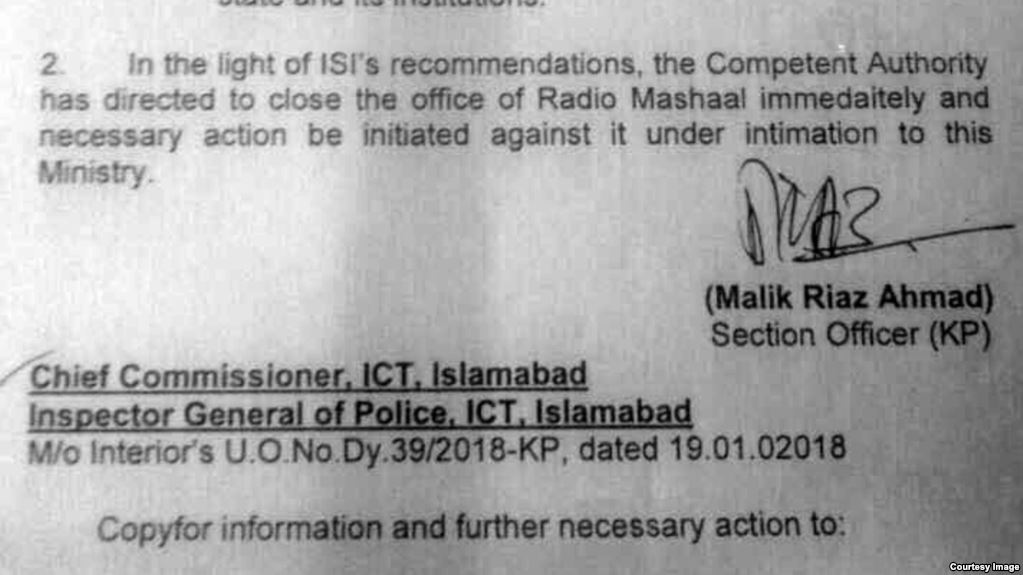Media rights groups, Pakistani political leaders decry Radio Mashaal closure

Washington, D.C. — Media rights organizations including the Committee to Protect Journalists (CPJ) and Reporters Without Borders (RSF) have been joined by representatives of a broad spectrum of Pakistani political parties in protesting a January 19 decision by Pakistan’s Interior Ministry to close the Islamabad bureau of Radio Mashaal, RFE/RL’s Pashto language service to Pakistan. The closure order followed accusations by the country’s Inter-Services Intelligence (ISI) agency that its programs are “against the interest of Pakistan” and “in line with [a] hostile intelligence agency’s agenda.”
Radio Mashaal was created in 2010 with a grant by the U.S. Congress, to combat extremism in Pakistan’s Federally Administered Tribal Areas (FATA) and Khyber Pakhtunkhwa province along the border with Afghanistan. While Mashaal continues to use cross-border AM and shortwave radio to reach its Pashto-speaking audience, it also counts more than 1.6 million Facebook fans, and registered 81 million video views on Facebook and 10 million views on YouTube in 2017.
CPJ Asia Program Director Steven Butler called the closure of Radio Mashaal’s Islamabad bureau “a draconian move by Pakistani authorities and a direct threat to press freedom in the country.” Noted RSF Asia Pacific Desk head Daniel Bastard, “It is not the job of the intelligence services to dictate the editorial line of a radio station that provides Pashto speakers with an alternative viewpoint.”
In comments made to Radio Mashaal, politicians from major Pakistani political parties active in the tribal areas condemned the closure of the Islamabad bureau. They emphasized that Radio Mashaal is a critical resource in the fight against terrorist networks and militancy in Pakistan, and noted Mashaal’s unique reporting on local problems and efforts to raise political and civic awareness in a region otherwise dominated by extremist propaganda:
- Aftab Ahmad Khan Sherpao — Member of Pakistan’s National Assembly, Chairman of the Qaumi Watan Party, former Interior Minister of Pakistan
“Radio Mashaal has its policy and it is airing reports/programs about the situation in Pashtun areas. So I believe banning Mashaal is not the right [approach]. And we believe that the ban must be immediately waived.”
- Usman Kakar — Pakistani Senator, Secretary General of the Pakhtunkhwa Milli Awami Party:
“The Pakhtunkhwa Milli Awami Party strongly condemns the ban of Radio Mashaal by the Interior Ministry. Hundreds of thousands of Pashtuns listen to Radio Mashaal, which provides information to the people. We know very well that mainstream Pakistani media, both private and official, do not air Pashto programs for the Pashto-speaking regions, including the tribal areas. Radio Mashaal is highlighting problems of those people, conduct interviews with them. The people are very happy with Mashaal programs.”
- Akhunzada Chattan — former Member of Pakistan’s National Assembly, senior leader of the Pakistan People’s Party:
“There is no denying the fact that whatever political awareness that we see in the tribal areas, particularly about the FCR [British-era Frontier Crimes Regulation] I can say that more than 50 per cent credit goes to Radio Mashaal. They [Radio Mashaal] performed the best service. And this is the reason that it was banned because it [Radio Mashaal] is creating political awareness among the tribal people”
- Afrasiab Khattak — former Pakistani Senator, senior leader of the Awami National Party:
“I believe Radio [Mashaal] did not do anything bad against the interests of the country. Rather [the radio] highlighted the problems of the backward areas, and that too, through the words of the local population. And then they let other people know about those problems. So this is a service [to the community].
- Professor Ibrahim Khan — Khyber Pakhtunkhwa chief of the Jamat-e-Islami party:
“Closing the radio, television or newspaper is not the right step. If there is a complaint against someone, they must be informed and if proved, only then can be punished. We condemn the one-sided move by providing no opportunity to the other party to present its clarification. We want the government of Pakistan to send a notice to the responsible authorities of Radio Mashaal. Talk to them and act only when they [the government] proved the allegation against them.”
- Mufti Ainuddin — senior leader of the Jamiat Ulema-e-Islam party:
“We believe that Mashaal Radio has truly highlighted many key issues and problems of Pashtuns and we are happy with that. We praise Mashaal for that. Banning media outlets is not the right step. And imposing a ban on media without reasons is also not a commendable step.”
Pakistan is ranked “Not Free” in Freedom House’s Freedom of the Press 2017survey, while RSF ranks Pakistan 139th out of 180 countries surveyed for its 2017 World Press Freedom Index.
Find out more
Contact Martins Zvaners
Deputy Director of Media and Public Affairs, Washington, DC
- zvanersm@rferl.org
- (202) 457-6948
